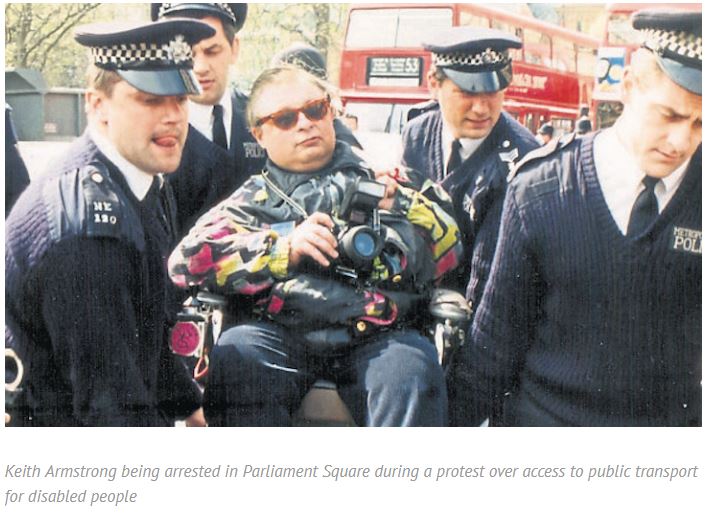http://camdennewjournal.com/article/keith-armstrong-a-one-man-machine-fighting-for-people-with-disabilities

Keith Armstrong, a one-man machine fighting for people with disabilities
He inspired campaign that made buses, taxis and most public buildings accessible to wheel-chairs
Camden New Journal 21 September, 2017 — By John Gulliver
Confined to a wheel-chair as a victim of polio from childhood, Keith Armstrong, who has died at 67, helped to inspire a movement that has made buses, taxis and most public buildings accessible to wheel-chairs. We take these reforms for granted but it took years of campaigning by stalwarts such as Keith to persuade public authorities to change their attitudes.
Nothing would stop him from challenging public perception about disability – he eagerly joined demonstrations, led them if necessary, argued for his rights even if it meant being arrested by the police, his campaigning became his life’s work.
Realising that words influence thought he objected to the use of the word “disabled” and helped to popularise instead the phrase “people with disabilities” – the point was that a disability is simply a part of a person’s life, not something that defines them completely.
Keith, who lived in Seymour House, Churchway, Somers Town, from the 1970s, was born in South Africa, but after his father died in a car accident, his mother returned to Britain for treatment of his condition. At a special school he soon demonstrated his creative spirit, launching his own poetry magazine.
He then came to London and found himself in the squatters’ movement until he was given a Camden council flat in Churchway. In the 1980s and 1990s he campaigned for accessible transport and, after blocking New Oxford Street with other wheel-chair users, found himself facing a trial until the charge was thrown out because the courthouse did not have ramp access.
A spirit and talent such as his soon attracted support from politicians and he became an adviser to both Camden and Ealing councils as well as London Transport and the Greater London Council. Typically big hearted, he would put up people in his flat – anyone who needed help knew they could turn to him. He got annoyed with the council because a flat opposite his was left vacant and, knowing of a woman with disability, Claire Glasman, was homeless he persuaded her and a friend to squat the empty flat.
Soon, he drummed up a campaign for the two women – and eventually they became council tenants. A restless creative spirit such as Keith’s meant he also became an accomplished poet, musician, a photographer and a scholar, publishing papers on the history of wheelchairs, the life of the emperor Claudius – many of his works can be found on academia.edu.
Apart from his non-stop involvement with disability campaigns, he had a boundless enthusiasm for other causes such as the Campaign for Nuclear Disarmament, and became a familiar figure in Somers Town and Camden Town, often playing his harmonica in Camden Lock.
He was a man of undying principles – and he stuck by them whatever the obstacles.
Campaigner took on discrimination
By CLAIRE GLASMAN
[Full tribute which was shortened by editor in the published version]
I first got to know Keith through the Liberation Network of People with Disabilities, one of the first groups of the current disability movement in the UK, which I attended in the early eighties. The Liberation Network broke new ground in many ways, recognising psychiatric in-patients as part of the disability community which was previously limited to physical disability, and being against animal experiments.
We realised we had crossed paths at open mic poetry events in the 1970s. Keith was a great talker, had wide-ranging interests and many progressive views. For example, if people said someone was a “bastard”, he would tell them “Check your language!” as it was perpetuating discrimination against people born outside marriage. He was knowledgeable about disability history and how the Nazi holocaust started — with the extermination of disabled children, and that the gas chambers in concentration camps had developed from taking psychiatric patients and people with learning disabilities from institutions and killing them with lorry exhaust, poison gas, lethal injections and starvation.
Keith lived in Seymour House, Churchway and was angry with the Council that another ground floor flat opposite had been left vacant for a very long time and was going to waste. He knew I was homeless in the local area, introduced me to another disabled woman friend of his, and helped us to squat this flat together. The nearby King’s Cross Women’s Centre (now Crossroads Women’s Centre in Kentish Town), which I was part of, helped with legal advice and a stressful but eventually successful campaign for the Council to grant us the tenancy, which was also supported by Churchway tenants.
We often went across to see Keith and were treated to some terrible meals of vegetables boiled for several hours without flavouring. He explained that he had lived in institutions where food just arrived in front of you and you never saw how to cook.
After we were rehoused to a different area, I saw Keith less often, mainly at community and disability meetings, and over time we gradually lost touch.
It’s very sad that he has gone, he made a big contribution to a lot of people’s lives.
Claire Glasman is a founder member of WinVisible, set up for women with disabilities, and based in Kentish Town

2 thoughts on “Obituary of Keith Armstrong and our tribute”